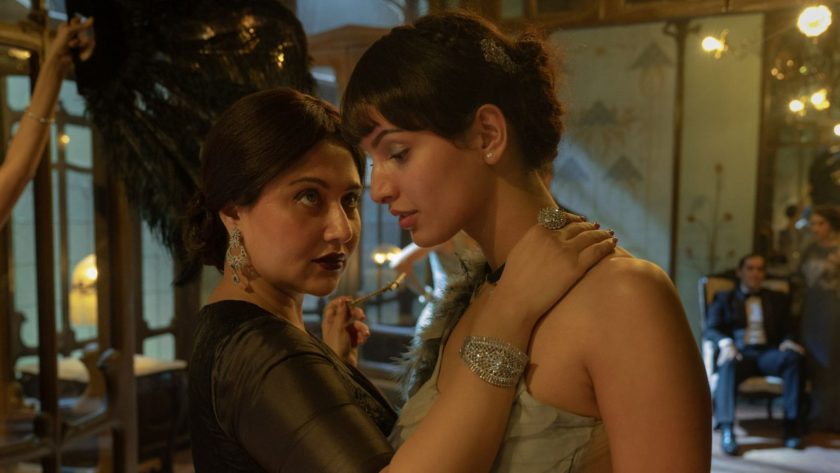Khushi Jain reviews Anvita Dutt’s sophomore feature Qala, a chronicle of the tumultuous relationship between a rising musician and her family in 1940s Calcutta.
Anvita Dutt debuted as a director in 2020 with the ruby-red-hued Bulbbul, an intelligently written and gorgeously shot story of female vengeance. Unfortunately, her second film, the pastel-blue-hued Qala, ambitious within and without, and just as beautiful as her previous feature, is exasperating and predictable. A biography of its titular character, the film, simply put, is the tale of a girl obsessively trying to win her mother’s affections through the art of music.
Qala (Tripti Dimri) grows up in a lavish house high in the mountains, learning music from her mother Urmila (Swastika Mukherjee). We are told that she was born a twin but her brother did not survive. The absence of a male heir means that Urmila cannot pass on the musical legacy of the family. Constantly disappointed in Qala, Urmila comes across the young orphaned singer Jagan (Babil Khan) and is impressed by his talent to such an extent that she decides to adopt him. Thus, Jagan becomes her lost son and Qala’s lost brother. What follows is a tense unravelling of young Qala’s sanity as she sees herself vanishing from her mother’s eyes. A handful of years pass, within which Qala establishes herself as a prominent singer in the film industry. The film travels back and forth in time, arranging itself piece by piece.

As is evident from its story, Qala is aspirational, but that is all it gets to be. The two main characters are conceptually intriguing but are written rather one-dimensionally. Qala is only ever anxious and nervous, always with quivering lips and a heaving chest. Urmila is a monolith of a patriarchal mother with absolutely no complexity and is played with a certain cold inflexibility by Mukherjee. Although Dimri, who was also Dutt’s lead in Bulbbul, gives a fine performance, the monotony of her character taints it. Moreover, the emotional trajectory of this mother-daughter pair is an absolute mess. Changes of heart are conspicuously sudden and psychological shifts are so dull that they become non-existent. Qala’s descent into madness, for instance, is less a descent and more a straight horizontal line. Jagan is the only character with any nuance, and so of course he is barely allowed to breathe onscreen. Khan provides a promising debut performance despite the extremely narrow window given to him. With so many great possibilities left untouched, Qala is essentially a graveyard of potential.
Cracks are nowhere more explicit than in the film’s narrative. In its eagerness to tackle too much, Qala ends up with too little. On one hand, there is the toxic parent-child relationship, and on the other, the misogyny rampant in the film industry. The film is unable to balance its thematic concerns, doing injustice to them. Subplots and minor characters are malnourished and even left unfinished. The momentous climax is rendered rather obvious in retrospect by the in-your-face-ness of the dialogue. Subtlety is replaced with an impatient need to tell rather than show. The film’s thematic epicentre of Macbethian guilt is rendered artificial and exceedingly dramatic. Sentimentality is more often than not jarringly intense, inducing constant abruptions. The in-house concert sequence, with allusions to Aronofsky’s Black Swan, indulges in cinematic stereotypes and is a particularly awkward fit to the film’s narrative.
Yet, there is something that Qala’s writing must be applauded and admired for. Throughout its runtime, the film is conscious of the medium within which it operates. While Dutt fails in the spheres of character and narrative, she shines as a writer in the film’s use of symbolism and metaphor. First and foremost, there is the moth, a winged insect irrevocably drawn to its own combustion. It appears on earrings, the brooch, Qala’s saree and the corpse. Even the light fixtures in Qala’s Calcutta home are shaped like moths. The second symbol worth taking note of is the maze. Qala and Jagan play a handheld game of guiding a small ball of mercury through a maze, and the garden outside Qala’s childhood home is designed in the image of that very maze. Important events take place around these two mazes, helping us imagine Qala in her own familial and musical labyrinth. Dutt’s skill with the pen is well-established and this is only proof of what this film could have been. She also litters Qala with a litany of poignant and poetic moments, such as Jagan’s introduction, Qala and Jagan with the thermometer, the retrieval of the corpse, and Qala hallucinating snow during a song recording.

This poeticism, erratically evident in the writing, is ubiquitous in every other technical aspect of the film. Siddharth Diwan’s cinematography ensures that each and every frame is worthy of being hung up on a wall. His use of colour, light and perspective renders Qala a gorgeous feast for the eyes. Production and costume design work closely in building and representing this period piece; there is immense attention to detail and awareness of the metaphorical framework evident in the mise-en-scene. The tone is rather gothic and Mary Shelley-esque, but instead of 18th-century Europe, it is set in the 30s and 40s in India. Full of soft and dark pastels, there is a nod to art deco in the architecture and interior design. The cherry on the cake is Amit Trivedi’s music. For a film about singers, of course, a lot rides on the soundtrack. Trivedi’s compositions for Qala are sweet and nostalgic which, when superimposed on Qala’s situation, are laced with a very interesting irony. Jagan’s songs are earthy and rooted, much like his character. Penned by an entourage of lyricists, the songs are contextually meaningful and engage with the themes and narrative considerably sensitively and much more than the characters do.
But this beauty and brilliance is style without substance. The weakness of character and narrative pulls the strength of the aesthetic away, dissociating the two. As a result, the film’s aesthetic competency is diluted. Qala’s deficiencies are too overwhelming and omnipresent to keep it afloat. Weighed down by itself, the film lacks exactly that which it is claiming to be: the refinement and sophistication so apparent in Dutt’s first film. At the end of the day, there is only so much that cinematic pastry can do.
Qala is currently playing on Netflix. Watch the trailer for the film here:




